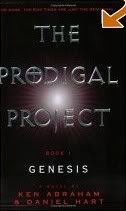 It is obvious what it was that inspired me to buy this book- it is religious in nature and about the end of the world, two of my favourite subjects (along with World War Two and nuclear warfare). This is part one of seven, as you can tell by the subtitle, and I am still unsure whether I will read all of the instalments even though I am curious. I am curious as to how of if Abraham is going to pull himself out of the reliance on time worn stereotypes, leading into racism and a clearly misogynistic point of view.
It is obvious what it was that inspired me to buy this book- it is religious in nature and about the end of the world, two of my favourite subjects (along with World War Two and nuclear warfare). This is part one of seven, as you can tell by the subtitle, and I am still unsure whether I will read all of the instalments even though I am curious. I am curious as to how of if Abraham is going to pull himself out of the reliance on time worn stereotypes, leading into racism and a clearly misogynistic point of view.It is a story about the Rapture, the time when all the good-hearted Christians are taken from the world to be with God. Millions are left behind but this story focuses on seven people, from a covert government worker to a mother with a disabled child. Most of them are non-believers, or rather not the devout going-to-church-every-Sunday-and-reading-the-bible-every-day Christians, unlike their families; they are the ones who couldn't fully accept what God, Jesus and the bible are all about.
Then there is Dante and Noir, the faces of good and evil, respectively. Azul Dante is attempting to establish the Prodigal Project, a corporation of sort that will try to reunite the world following the Rapture, the project to which all the characters are drawn to or will be drawn into at some point (as you could have discerned by the title).
This was novel published in 2003, which was after the planes hit the World Trade Centre and written, I assume, before the invasion of Iraq. It is riddled with thinly veiled attacks on Muslims, lumping them all into one category and trying it's hardest to not look racist, sort of in the same manner that someone say "I'm not homophobic, I just don't think its right." It infuriates me that he tries to justify it but continues to push the stereotypes, not least of all by having them as the enemy to the Western world, run by the devil himself. Abraham is clearly a Republican; his disappearing President is a barely concealed Bush, which pushes the idea that he is infallible.
You get glimpses of intelligence shining through at times, Abraham having strong female protagonists who are destined to do something worthy (but it is yet to be seen what it is that they do, I see a whore of Babylon shining through in one of them), but he brings that crashing down by insinuating that the only way that a woman could be perfect was to stay at home and succumb to her husband's every whim.
I will read the following book in the (desperate) hope that Abraham is just a good writer who is toying with the reader, leading them down a path that will lead to a completely different conclusion (and hopefully stop being so racist), but that is yet to be seen.
This instalment is basically the opening chapter to the following books, setting the scene and character development- it is very little other than a couple of hundred pages of evangelism. It's almost like trying to review a book after reading the first chapter (then again, we all know that I have probably predicted the outcome already). I'll read the next one before I decide to recommend it or not.
Labels: Ken Abraham
